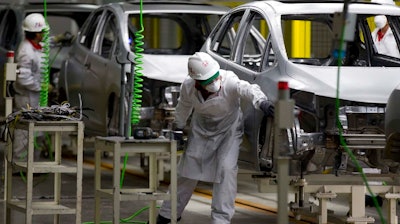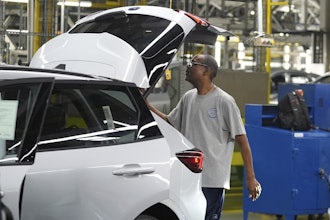
MEXICO CITY (AP) — Many in the U.S. government, and even some in Mexico, say the new trade agreement between the two countries will help increase the extremely low wages in Mexico's auto industry.
But activists say the trade agreement won't do that — or stop the steady flow of jobs south — until Mexico changes its labor laws and eliminates pro-company "protection contracts" that effectively leave workers helpless. The agreement announced Monday includes some vague promises in that direction, but essentially leaves it up to Mexico, where a web of government complicity so far has blocked progress.
Activist Pablo Medina says he and 57 fellow workers were fired from the Goodyear tire plant in San Luis Potosi on July 9 after trying to organize an independent union at the factory, where two years went by without employees even seeing the union that supposedly represented them.
Goodyear employees staged a spontaneous strike on April 24 after an employee passed out and broke three ribs in the heat of the vulcanizing department, and workers got news that the long-awaited increase to their $1.50-per hour wages would amount to only about 50 cents per day.
"The working conditions inside the Goodyear plant are very unsafe, the employee turnover is very high, and of course the wages are very low," said Medina, who is now fighting to get his job back.
In an emailed statement, Goodyear Mexico denied the plant was unsafe, saying it is "a competitive employer within the area" on wages. It said this year's wage increase was 6 percent — which is roughly equivalent to last year's inflation rate. It acknowledged a group of employees was fired after the work stoppage, but denied there were 57.
One key reason why wages are so low — about one-tenth of wages at U.S. plants — are "protection contracts" that workers have almost never signed, voted for or even seen. Goodyear, for example, signed a labor contract with the pro-government CTM union in April 2015, months before its San Luis Potosi plant even opened or the first worker was hired.
Goodyear didn't deny that but said the contract "complies with all Mexican labor laws and regulations."
The U.S. Trade Representative's Office said in statement Monday that the deal's insistence on enforceable labor rights "represents the strongest provisions of any trade agreement." Under the pact, "Mexico commits to specific legislative actions to provide for the effective recognition of the right to collective bargaining," it added.
But Mexican Foreign Relations Secretary Luis Videgaray told The Associated Press that the agreement doesn't oblige Mexico to do much at all, beyond implementing the vaguely worded constitutional amendment passed last year that requires workers be consulted and consent to labor contracts. "But that requirement doesn't come from the agreement, but from the constitutional reform adopted last year," Videgaray noted.
And the first draft of the law Mexico is supposed to pass under the agreement was written by Tereso Medina, the pro-government union leader who signed the protection contract at the Goodyear plant. The law hasn't passed, but it would have given people like Medina — who also served as a ruling-party senator — a key role on a board overseeing collective bargaining.
Rep. Sander Levin, a Democrat from Michigan, said "Mexico has been very, very determined to date to essentially have an industrial policy based on very, very low wages. ... Protection agreements are rampant throughout the industrial economy, there are thousands and thousands of them."
"Unless there's assurance that the present industrial policy and low wage structure in Mexico is effectively addressed (in the new agreement) I don't there will be very many Democrats who would vote for it, and I don't think it will succeed," Levin said.
The USTR hailed another "key achievement" in the new accord: "To support North American jobs, the deal requires new trade rules of origin to drive higher wages by requiring that 40-45 percent of auto content be made by workers earning at least $16 USD per hour."
That won praise even from Mexico's leftist President-elect, Andres Manuel Lopez Obrador, who will take office Dec. 1.
"We see it as a positive thing that it (the agreement) establishes an increase in the wages of workers in the automotive industry," Lopez Obrador. "We have agreed with that from the start."
But Levin said, "We're not sure what the impact of the content rules will be." Some reports suggest the 40-percent content rule could count engineering work performed in the U.S.
"First of all, what will be considered part of the 40 percent? If it includes intellectual property, for example, it won't be anywhere near 40, 45 percent" of the content by factory workers.
Videgaray suggested the requirement was a very long-term goal, given that Mexican average auto industry wages — an average of about $3.14 per hour — would have to increase by a factor of five to reach the $16-per-hour level.
"There is no doubt this agreement creates incentives for the salaries in the auto industry grow over time ... This generates a clear incentive for the salaries in Mexico eventually reach a higher level," Videgaray said. "There is not a defined period of time to reach this objective."
The $16-per hour clause is widely seen as just a stand-in for Trump's original demand, since dropped, that the North American Free Trade Agreement require at least 50 percent U.S. content in autos.
Medina, the fired tire plant worker, isn't pinning his hopes on the trade accord, or the prospect that Lopez Obrador's administration — which along with its allies will have a majority in Congress — can push through better legislation.
"We would like, within NAFTA, for there to be some safeguards for workers, not just businessmen," said Medina. "We have hopes that things will change, but not because of the incoming administration, but because of workers putting up a fight."
Things are not quite moving in that direction: Despite promises in 1994 that NAFTA would gradually close the Mexico-U.S. wage gap, the opposite has happened. According to a study by the Colegio de Mexico, an elite academic institution, "the wage gap between the countries has not persisted, it has gotten wider." While U.S. autoworkers made 5.4 times as much as their Mexican counterparts in 1994, by 2016 they were making 9.1 times more.
"The issue of core labor standards was the key issue when NAFTA was negotiated 25 years ago, and the failure to address it effectively was the main area of dispute and the main reason most of us Democrats voted against it 25 years ago," Levin said. "Based on what I know, there is no assurance that what has been negotiated so far would effectively address this core issue."






















